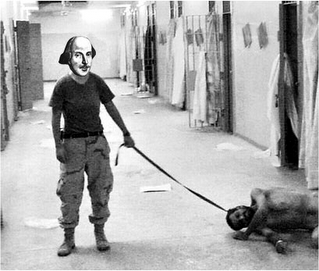 Having just written what, if memory serves, is my first political post (gee I'm diversifying) I was reminded that Shakespeare himself, although he died 63 years before it was codified, understood the principle of no imprisonment without trial. Indeed he expressed these principles with an eloquence that modern authors lack, as is evidenced by this quote from the play MacLearlet (Act V scene I). Written around 1603 the play (one of the lesser performed tragedies) follows the trials of Eustache MacLearlet, a pauper imprisoned without trial because of his resemblance to the crown prince. Often disregarded by critics as derivative of his earlier work, it none the less has influenced other artists. Perhaps most notably Leonardo DeCaprio whose The Man in the Iron Mask plagiarizes this work unashamedly. It is also credited with being the inspiration for Samuel Clemens' seminal American novel The Prince and the Bogshite.
Having just written what, if memory serves, is my first political post (gee I'm diversifying) I was reminded that Shakespeare himself, although he died 63 years before it was codified, understood the principle of no imprisonment without trial. Indeed he expressed these principles with an eloquence that modern authors lack, as is evidenced by this quote from the play MacLearlet (Act V scene I). Written around 1603 the play (one of the lesser performed tragedies) follows the trials of Eustache MacLearlet, a pauper imprisoned without trial because of his resemblance to the crown prince. Often disregarded by critics as derivative of his earlier work, it none the less has influenced other artists. Perhaps most notably Leonardo DeCaprio whose The Man in the Iron Mask plagiarizes this work unashamedly. It is also credited with being the inspiration for Samuel Clemens' seminal American novel The Prince and the Bogshite.In this scene MacLearlet, having been released from his cell by traitors, stands before the full bench of the Privy Council, blinded by unaccustomed daylight he cries out for them to tell him for what crime he has been detained.
Alas poor habeas corpus ad subjiciendum, I knew it Lords of His Majesty's Most Honourable Privy Council. A principle of great writ, of most excellent history. It hath borne evidence of its need ten thousand times. And now how abhorred in my imagination it is! My gorge rises at it. Here stood those words I had needed, thank God never. Where be its quiddits now, its quillets, its cases, its tenures, that were wont to set the courts on a roar? No one now will mock your nation's short falling? Quite chopfallen? Now get you to the Prince's chamber, and tell him, let him lie the war over, but this act history must remember. Would he care about that?

No comments:
Post a Comment